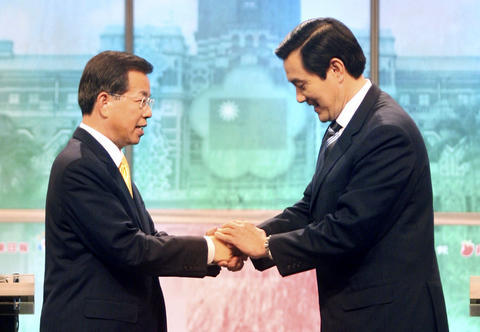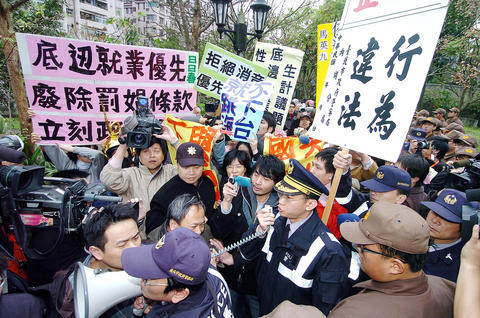Democratic Progressive Party (DPP) and Chinese Nationalist Party (KMT) presidential candidates Frank Hsieh (謝長廷) and Ma Ying-jeou (馬英九) went head to head in their first pre-election televised debate yesterday. They discussed issues ranging from national identity and cross-strait affairs to the economy, environment and social welfare.
Both saw eye to eye in seeking direct transportation links with China, with Hsieh and Ma pledging to negotiate and implement weekend direct charter flight services within three months of being elected president. Ma added that he would push for daily flights within six months.
On national identity, Ma, a Mainlander born in Hong Kong, stressed his Taiwanese identity promising to prioritize the nation's future and people's needs if elected.

PHOTO: REUTERS
"I am Taiwanese. I am a Taiwanese who grew up in Wanhua. I am a Taiwanese who grew up eating Taiwanese rice and drinking Taiwanese water," he said.
"I want to act as an upright Taiwanese, and I will be buried in this land. I gave up my job in the US and I gave up my [US] green card. Nothing will change my love for Taiwan," Ma said.
Hsieh said he has never hesitated to call himself Taiwanese and that he has educated his children to think likewise.

PHOTO: CHEN TSE-MING, TAIPEI TIMES
Hsieh criticized Ma for being inconsistent in defining his identity as a decade ago he had called himself a "new Taiwanese," changing it to "Taiwanese and Chinese" five years ago and then yesterday calling himself a "genuine Taiwanese."
Pressing on allegations that Ma holds permanent US residency -- an issue the Hsieh camp has hinted indicates a lack of confidence in Taiwan's future -- Hsieh yesterday questioned whether Ma was willing to promise that he and his wife had never possessed US or Hong Kong citizenship.
Hsieh also asked whether Ma would apologize to the public if evidence proved that he possessed US permanent residency before Jan. 27 this year.
"National identity is not a lip service issue," he said. "When Vice President Annette Lu (
Ma responded that he had explained twice last month that he and his wife Chow Mei-ching (
"My wife and I did not obtain permanent residency or nationality from the US or other countries," he said. "We did once have green cards, but we gave up residency 20 years ago."
The two also crossed swords on the issue of integrity, accusing each other of corruption.
Hsieh became emotional when Ma questioned the integrity of Hsieh's aides involved in various corruption charges, while querying Hsieh's role.
Ma, while pledging to put his and his wife's stocks into a trust and vowing to prevent his family members from serving as government officials if elected, condemned Hsieh over Kaohsiung City Government officials' alleged involvement in corruption cases under his administration.
"Shouldn't you be responsible for government officials' corruption cases as a former premier and Kaohsiung mayor? Should people tolerate such a government for four more years?" Ma said.
In response, Hsieh, noting Ma's graft charges over his mayoral allowance case during his stint as Taipei mayor, criticized Ma for double standards.
Hsieh also dismissed Ma's claim that none of his aides were indicted for corruption and berated Ma for requesting that the prosecutor handling his corruption case be removed.
In response, Ma insisted that he was found not guilty in two trials, urging Hsieh to take responsibility for the corruption cases in Kaohsiung.
On foreign affairs, Hsieh said one way to resolve problems was to develop closer relations with non-governmental organizations.
Using money for diplomatic purposes was not "dollar diplomacy," Hsieh said, because the US once provided Taiwan with financial assistance. Taiwan in turn must help others now it is better off, he said.
Vowing to maintain peace across Taiwan Strait and not to address the issue of unification with China if elected, Ma said he would demand that China stop marginalizing Taiwan on the international stage and call for a ceasefire with Beijing on the diplomatic battlefield.
In response to Ma's proposal of a "diplomatic truce" with China, Hsieh said nobody would oppose the idea, but the question was what price the country would have to pay.
"Foreign affairs must transcend party lines. Political parties must cooperate and the people must unite or it will give Beijing an opportunity to take advantage of us," he said.
"We will not have many bargaining chips on the negotiation table if political parties see their rival's failure as their achievement," he said.
In order to have a better visual effect for the audience, organizers prepared a platform for Hsieh to stand on so he could appear to be the same height as Ma. Hsieh is 165cm tall and Ma is 178cm.
The first segment of the debate yesterday had Hsieh and Ma respond to 20 videotaped questions selected by the organizers from among 456 questions contributed to PeoPo, a Web site specially set up for the general public to express their concerns on the Internet over the candidates, their policies and the future of Taiwan.
The 20 people chosen were then given the opportunity to question both candidates directly at the debate, based on the candidates' answers to the videotaped questions, which included issues such as Taiwan's national identity, Taiwan's participation in the Kyoto Protocol, same-sex marriage, the promotion of aboriginal culture, social welfare and economic development.
Hsieh and Ma then challenged each other with three questions in the second section of the debate, with responses to be made within a time limit of one minute.
At the end of the debate, Hsieh and Ma were each given three minutes to make concluding remarks.
In his concluding remarks and at a post-debate press conference, Hsieh questioned Ma's ability, saying the KMT candidate makes many promises but hardly ever delivers.
"His promises are like a restaurant menu. The question is whether he can cook those dishes and whether they are edible," he said. "He tends to say one thing in the morning but change it in the evening. How can he expect the people to trust him?"
He also questioned Ma's honesty.
Hsieh said Ma had not answered his question about the green card issue but had only reiterated that his green card was already invalid.
Outside the Public Television Service building in Neihu, where the debate took place, several interest groups staged protests before the start of the debate.
Members of the Collective of Sex Workers and Supporters made a plea for the decriminalization of prostitution. They also asked the two candidates to present detailed policy regarding how to assist the disadvantaged.
A coalition of labor groups requested the two candidates make good on their promises or step down or "jump into the sea."
Yesterday's debate was the first of two televised debates organized by the Central News Agency, the Liberty Times (the Taipei Times' sister newspaper), the China Times, the United Daily News, the Apple Daily and the Public Television Service.
The second debate has been scheduled for March 9.
ADDITIONAL REPORTING BY CNA

The CIA has a message for Chinese government officials worried about their place in Chinese President Xi Jinping’s (習近平) government: Come work with us. The agency released two Mandarin-language videos on social media on Thursday inviting disgruntled officials to contact the CIA. The recruitment videos posted on YouTube and X racked up more than 5 million views combined in their first day. The outreach comes as CIA Director John Ratcliffe has vowed to boost the agency’s use of intelligence from human sources and its focus on China, which has recently targeted US officials with its own espionage operations. The videos are “aimed at

STEADFAST FRIEND: The bills encourage increased Taiwan-US engagement and address China’s distortion of UN Resolution 2758 to isolate Taiwan internationally The Presidential Office yesterday thanked the US House of Representatives for unanimously passing two Taiwan-related bills highlighting its solid support for Taiwan’s democracy and global participation, and for deepening bilateral relations. One of the bills, the Taiwan Assurance Implementation Act, requires the US Department of State to periodically review its guidelines for engagement with Taiwan, and report to the US Congress on the guidelines and plans to lift self-imposed limitations on US-Taiwan engagement. The other bill is the Taiwan International Solidarity Act, which clarifies that UN Resolution 2758 does not address the issue of the representation of Taiwan or its people in

US Indo-Pacific Commander Admiral Samuel Paparo on Friday expressed concern over the rate at which China is diversifying its military exercises, the Financial Times (FT) reported on Saturday. “The rates of change on the depth and breadth of their exercises is the one non-linear effect that I’ve seen in the last year that wakes me up at night or keeps me up at night,” Paparo was quoted by FT as saying while attending the annual Sedona Forum at the McCain Institute in Arizona. Paparo also expressed concern over the speed with which China was expanding its military. While the US

SHIFT: Taiwan’s better-than-expected first-quarter GDP and signs of weakness in the US have driven global capital back to emerging markets, the central bank head said The central bank yesterday blamed market speculation for the steep rise in the local currency, and urged exporters and financial institutions to stay calm and stop panic sell-offs to avoid hurting their own profitability. The nation’s top monetary policymaker said that it would step in, if necessary, to maintain order and stability in the foreign exchange market. The remarks came as the NT dollar yesterday closed up NT$0.919 to NT$30.145 against the US dollar in Taipei trading, after rising as high as NT$29.59 in intraday trading. The local currency has surged 5.85 percent against the greenback over the past two sessions, central